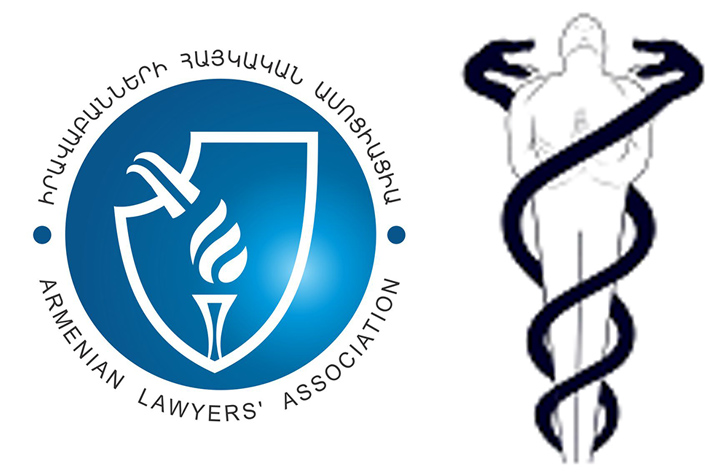
ANNOUNCEMENT
“Armenian Lawyers’ Association” and “Armenian Association of Young Doctors” NGOs condemn the behavior of the Ministry of Health of the Republic of Armenia related to writing prescriptions without maintaining the procedure.
The organizations have issued a statement in which it is particularly mentioned:
“On 28 February, 2018, pursuant to the requirements of the RA Law on Drugs, the Government Decree N 1402-N of 9 November 2017 entered into force, which provides for the forms of prescriptions, as well as the procedures of writing prescriptions, providing medicines, and registration procedures drugs. It should be noted that this decision does not define the list of drugs provided with or without prescriptions.
In particular, the analysis of the RA Law on Drugs, Article 16, Part 25, provides that the lists of drugs provided with or without prescriptions should be defined by the RA Ministry of Health in the person of the Minister of Health. In addition, the above-mentioned norm implies the publicity of these lists and their publication in the official website of the Ministry.
It should be noted that although the Ministry of Health has published a list of drugs provided with or without prescription, however it does not mention the legal act that is the order of the RA Ministry of Health, which provides for these lists. It is noteworthy that in the official website, arlis.am there are two Orders of the Minister of Health of the Republic of Armenia on the confirmation of the list of prescribed drugs and those provided without prescription. The ridiculous thing is that these two commands were adopted in 2005 and 2007, in compliance with the old Law on Drugs, which was abolished upon the adoption of the new Law on Drugs, on 17 May, 2016. According to the RA Law “On Legal Acts” the “Relevant provisions of other legal acts having ensured the implementation of a legal act declared invalid, shall lose their legal effect at the same time when the disputed act loses its legal effect.”
The above mentioned means that at this point there is no current legal act that could be grounds for classifying the drugs according to the lists of medicines provided with or without a prescription, and which actually cannot ensure compliance to the requirements of the RA Law on Drugs and the Government Decree N 1402-N, which came into force on 28 February.
From the analysis of Article 19 (1) of the RA Law on Legal Acts it becomes clear that Ministers of the Republic of Armenia shall adopt orders, only within the scope of the powers vested in them under the legislation of the Republic of Armenia. In this case, as mentioned above, the Minister of Health of the Republic of Armenia was obliged to issue orders, defining the lists of drugs provide with or without prescriptions. However, when watching the press conference of the Minister of Health of Armenia, it turned out that the latter not only did not even defined such a legal act but generally does not know that he has such a commitment. Moreover, he mentioned in his speech that this legal act will be passed by the Government of the Republic of Armenia; in fact, recognizing that such an act still does not exists de jure. There is no legitimate requirement for doctors, patients and pharmacists, as required by Article 68 (3) of the RA Law on Legal Acts, a person shall not be obliged to fulfil the requirements of a legal act not having legal effect, as well as not promulgated or not having entered into force as prescribed by this Law. A person may not be subjected to liability for the violation of the requirements of a legal act not having legal effect, as well as not having been promulgated or entered into force as prescribed by this Law.
It should be noted that according to Article 92 of the RA Law on Legal Acts, the “Application of a regulatory legal act having no legal effect, as well as of a regulatory legal act not having entered into force as prescribed by this Law, failure to promulgate or provide — as prescribed by this Law — legal acts relating to rights, freedoms, and privileges of legal and natural persons, or impediment to the provision thereof, impediment to the implementation of a legal act which has entered into force in the prescribed manner and is effective, or failure to take appropriate measures by the official authorised for ensuring the implementation thereof, shall entail administrative, criminal and disciplinary liability prescribed by law.”
According to Article 14 of the Code of Administrative Offenses, Officials are subject to administrative sanctions for administrative offenses related to … the protection of the health of the population and the failure to comply with the other rules, the enforcement of which is included in their official duties.
In conclusion it should be mentioned that the RA Law on Drugs has significant shortcomings and gaps that will hinder its effective application and will lead to corruption risks. “The Armenian Lawyers’ Association” and ” Armenian Association of Young Doctors ” NGOs offer to create an ad-hoc working group aimed to eliminate these shortcomings and gaps and express their willingness to participate in the activities of the group activities.”
